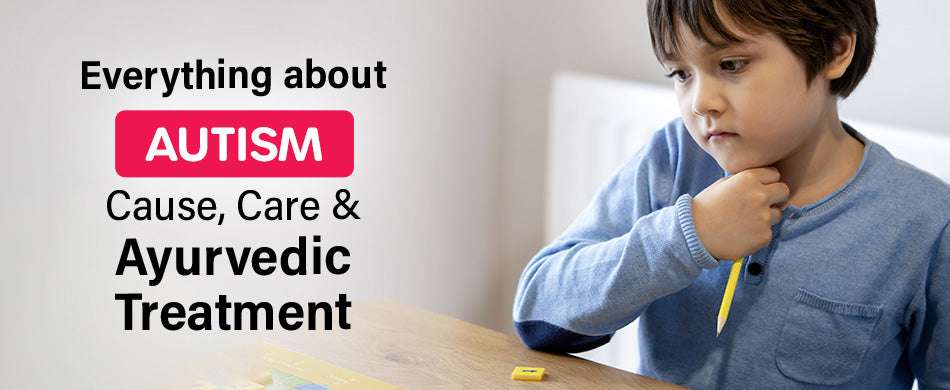Everything about Autism: Cause, Care & Ayurvedic Treatment
- by Baby Organo

Autism spectrum condition (ASD) affects behaviour and communication. It causes social issues, repeated habits, and speech and nonverbal communication issues. ASD can impede functioning from modest to severe. Genetic and environmental factors may cause ASD, but there is no recognized cause.
Behavioural, linguistic, and pharmacological treatments are used to cure autism. Early intervention can improve ASD outcomes, but there is no cure. If you or someone you know has ASD, get professional treatment. This blog discusses ASD causes, symptoms, treatment, and prevention.
What is Autism?
Autism is a developmental disease that affects social interaction, reciprocal communication, and the ability to understand others' feelings and behaviours. This illness hinders communication and interactions with healthy people.
They lack communication skills and may practice strange rituals. The term "autism spectrum disorder." refers to a group of conditions. Autism, a developmental neuro-behavioural condition, affects social, communicative, emotional, and cognitive processes.
Symptoms of Autism:
Autism usually appears in toddlerhood. Some are born with symptoms.
The following are Common Autistic Symptoms:- Avoid eye contact.
- Minimal or narrow worldview.
- Repetitive behaviours include repeating a word or phrase, rocking, or fiddling with a light switch.
- Extremely sensitive to subtle stimuli.
- Internalizing and avoiding others.
- Avoiding others' points.
- Not wanting physical interaction.
- Difficulty comprehending or expressing oneself through spoken language, body language, or tone of voice.
- Using a monotone, mechanical, or sing-song voice.
- Difficulty adjusting to new situations or routines.
- Seizures are a possible symptom of autism in certain children. These may not manifest until the teen years.
Children with Autism Symptoms:
- The symptoms of autism in children might vary. Potential examples are:
- Not recognizing their name at the age of 9 months.
- Not expressing emotions for nine months.
- Refusing to participate in even the most basic of games at the age of 12 months
- Fails to make use of gestures (such as waving hello) by the age of 12
- By the age of 24 months, they have no concept of the emotions of others.
- By the age of 36 months, shows no signs of noticing or wanting to join other children in play.
- Can't do any form of entertainment for you by the age of 60.
- Puts toys in a row, and if the order is disturbed, she becomes unhappy.
- Exhibits a preoccupation with the same subject
- moves in a rocking motion, flapping their hands, or circling their body
- Cognitive, communicative, motor, or developmental delays
- Habits of eating and sleeping strangely
- A lower or higher-than-normal level of apprehension
- Adults with Autism Exhibit the Following Symptoms:
- Certain behaviours are more indicative of autism in adults. Common symptoms may include the following:
- Difficulty picking up on emotional cues from those around you
- Whether via deliberate isolation or friendship difficulties
- Fear of Participating in Group Activities
- Observing a schedule and reacting negatively to any deviations
- Having trouble putting your feelings into words?
- Not getting the joke or failing to recognize the irony.
- It was unintentionally coming out as unpleasant, disinterested, or abrupt to other people.
- Adults may also exhibit the following symptoms of autism
- Withholding gaze
- Not being aware of or able to follow social "rules."
- Avoiding physical contact with people or becoming irritated if they attempt to do so
- Taking a keen interest in a narrow range of topics
- Detecting subtle odours, noises, or patterns that others miss
- The desire for extensive preparation before action
What Causes Autism?
Autism has several potential origins. Many factors, both internal and external to the developing kid, interact in complicated and changeable ways.
- Genetics
The prevalence of autism in some families strongly suggests a hereditary component to the illness. There are likely more than 60 genes involved with autism, and of those, a subset of those 60 genes has a more than 90% likelihood of being the cause.
Autism has also been linked to some extremely uncommon mutations in key genes. De novo mutations, also known as novel mutations, arise spontaneously when there is no known family history of autism. They help spread the illness danger around.
Study results published in the journal Cell suggest that de novo mutations, previously thought of as spelling errors that change a single letter of the DNA code, are structural variants where there are insertions or deletions of entire words or sequences of the DNA code. These mutations arise at a rate that is 20% higher than expected.
Researchers found no evidence that autistic children had more mutations than neurotypical children but that the modifications that were present were more likely to affect genes important in brain development.
- Epigenetic Factors
Epigenetic factors are non-genetic or environmental in origin, and they can raise a child's risk of autism when combined with a hereditary predisposition to the disorder. Some examples of epigenetic factors include diet, medication, and psychological strain.
Epigenetic modifications alter the DNA's bases rather than the DNA's sequence. The risk factors that might raise the likelihood of a newborn being born with autism disorder are still the subject of active study.
- Diet
- Pesticides and phthalate exposure
- Terbutaline and other drugs to prevent preterm birth
- Seizure medication valproic acid
- Medication for regulating mood and schizophrenia
- Intoxication by mercury
- Deficiency in vitamin and mineral use.
- Vaccine intolerance due to thimerosal, a preservative frequently used in multiple-dose immunizations
- Researchers have identified birth and its surrounding environment as a probable trigger for autism.
- The risk of decreased brain oxygenation due to breech presentation or other delivery complications.
- An infant with a low Apgar score (the indicator used to evaluate a baby's health immediately after birth and again after five minutes) is not in good health.
- A family history of mental illness, especially schizophrenia, depression, or bipolar disorder
- The age disparity between parents at conception
- Pregnancy-related sickness in the mother
Types of Autism:
Contemporary specialists identify three basic autism subtypes: Autistic Disorder, Asperger's Syndrome, and Pervasive Developmental Disorder. All of these illnesses are now autism spectrum disorder. Older terminology retains its original meanings:
1) Autistic Disorder
Autism in its "classic" form. When people hear the word "autism," they automatically assume the worst. People with autism spectrum disorders typically exhibit atypical interests and behaviours, as well as a delay in language development. People living with autism spectrum disorder may falsely depict an intellectual handicap.
2) Pervasive Development
Disorder PDD-NOS and atypical autism are two more names for this condition. Individuals who meet certain diagnostic criteria for autism spectrum disorder and some for Asperger's syndrome but not for both are likely to have atypical autism. Fewer and less severe symptoms are present compared to autistic disorder.
3) Asperger’s Syndrome
Less severe manifestations of autism characterize Asperger's Syndrome. People with Asperger's syndrome may have trouble interacting with others and display eccentric traits. On the other hand, they are not illiterate or mentally disabled.
What is the Most Effective Treatment for Autism?
Drugs are not effective in treating autism, although a variety of therapies may help a kid with the disorder.
The following are examples of frequent types of intervention:
Social skills, focus, sleep, play, anxiety, parent-child connection, and difficult behaviours are only some of the topics covered by behavioural programs. ABA is the foundation of behavioural treatment that monitors a child's growth as he acquires new abilities.
- Lovaas Method
- Education and Learning Programs
- Medications
Ivar Lovaas, Ph.D., of the UCLA Clinic for the Behavioural Treatment of Children, created the Lovaas approach. Some youngsters benefit from this method of altering their behaviour. This requires 40 hours of weekly one-on-one time. The technique, which teaches skills in a structured, incremental fashion, goes by the acronym "DTT" (for "discrete trial teaching").
TEACCH is a behaviour management program that teaches autistic children to utilize predictable social behaviours. This will teach the child self-care. The program helps people change their behaviour. This enhances the child's desire for the familiar, which makes them happy but limits their ability to adjust to new settings. Non-high-functioning autistic children gain substantially from this strategy.
Medication may alleviate some of the symptoms of autism in a kid by reducing challenging behaviour and other manifestations of the illness, but it will not treat the underlying cause. The medicine may help the parents deal with their autistic children.
Risperidone and aripiprazole are dangerous antipsychotics suitable only for severe situations. They reduce anxiety, sadness, aggressiveness, hyperactivity, and self-harm. Common examples of these types of antidepressants are fluoxetine and citalopram.
Other medicines include methylphenidate, guanfacine, amphetamine, and dextroamphetamine combinations, and other stimulants and hyperactive medications. Removal of heavy metals from the body using chelation treatment is also an option.
Other Treatments and Therapies:
- Counseling for Sensory Integration
- Therapeutic Play
- Music Therapy
- Picture Exchange Communication System (PECS)
- Auditory Integration Training (AIT)
Children learn about their bodies and senses by actively engaging in activities like rolling, swinging, leaping, and spinning. Specialist therapists are the ones who implement these procedures.
When working with children, therapists often use play and follow the child's lead. The goal is to improve the child's ability to communicate and
This treatment includes musical activities such as singing, playing instruments, and moving to the beat. Helping children with developmental difficulties engage with others through nonverbal exchanges and facilitated play.
The goal of this approach is to better one's ability to express oneself. There is no better way to adopt PECS than with the help of Lori Frost, MS, and Dr. Andrew Bondy's comprehensive instruction booklet.
Developed as a treatment for deafness, this method trains the brain to better differentiate between sounds of different frequencies. This therapy is effective for children with some forms of autism, particularly in helping them overcome their fear of specific noises.
Home Remedies to Heal Autism Naturally
Fish oil, magnesium, melatonin, probiotics, antibiotic and antiparasitic drugs, dietary modifications, vitamin D, turmeric, and detox baths are some of the most effective home cures for autism.
Autism and Home Remedies
Some of the most often used treatments for autism at home are:
- Magnesium Supplements
- Fish Oil
- Melatonin
- Gut Health & Probiotics
- Sugar-Free and Gluten-Free
- Candida Detox
- Vitamin D
- Vitamin C
- Turmeric
All children require a balanced diet, but autistic children may benefit from magnesium supplements. Autistic children often have magnesium deficiency symptoms, including rocking, teeth grinding, anxiety, poor focus, and short attention spans.
Adding magnesium to one's diet will reduce these symptoms, allowing for improved behavioural therapy and behaviour.
The body needs omega-3 fatty acids and other acids for proper growth and function. Researchers have shown that giving autistic patients omega-3 fatty acids reduces their hyperactivity and calms their disruptive behaviours, improving sociability.
Thirteen autistic children, ages 5 to 17, participated in a 6-week, randomized, double-masked trial and demonstrated reduced hyperactivity after eating a diet high in omega-3 fatty acids. The study's authors speculated that youngsters with autism may benefit from taking omega-3 fatty acids. Omega-3 fatty acid supplements are widely available, with fish oil being one of the most potent and convenient sources.
Sleep disturbances are one of the most closely linked diseases and symptoms associated with autism. Irritability, difficulty concentrating, social anxiety, and persistent tension are only some of the side effects of a disturbed sleep schedule.
However, melatonin is a calming, sedative hormone that may ensure autistic youngsters get enough healthy, restful sleep (Swiss Medical Weekly Journal 2005). Sleep deprivation and its associated habits will improve, allowing for more time spent honing interpersonal and communicative chops.
Several studies (Adams et al., BMC Gastroenterology, 2011) have pointed to dietary factors as a possible cause of autism. In other words, the severity (or possibly the formation) of autism was mostly attributable to gut health and food consumption. The greatest treatment for autism is probiotics because of the association between intestinal permeability and autism.
Probiotics promote the proliferation of helpful bacteria in the digestive tract, which in turn improves nutrition absorption and prevents harmful bacteria from thriving there. Yoghurt is a good source of probiotics, and a healthy gut may help alleviate certain autistic symptoms.
Although studies on this therapy approach are still in their infancy, many people feel that cutting out sugar, gluten, and other processed foods can help alleviate autistic symptoms and restore "normal" behaviour.
This is a highly contentious issue now, especially in light of the recent surge in "gluten-free" diets that have gained popularity regardless of whether their adherents have a food allergy.
Some environmentalists believe that the presence of Candida bacteria and other parasitic substances that leave harmful residues in the stomach contributes to the development of autism in children.
Many of the symptoms of autism may have their origins in this extremely dangerous bacterial exposure at a young age. Therefore, preventing youngsters from coming into contact with harmful germs and parasites is crucial in eliminating their risk of contracting the disease.
All too often, we ignore this vital mineral in favour of the more "high-profile" vitamins. However, vitamin D is essential for moms and their kids. As was just discussed, the gastrointestinal system plays a crucial role in the development of autism, and it has been related to low levels of vitamin D in pregnant women, as well as leaky gut syndrome and other diseases affecting the gastrointestinal system. Finally, vitamin D influences neurotransmitter function, commonly impaired in autistic people.
Scurvy appears to be more common in people with autism, as though their systems do not absorb or consume it well enough, lending credence to the efficacy of a dietary approach to ameliorating autism symptoms.
Some autistic people may find relief from their symptoms and heightened sensitivity via maintaining a high vitamin C intake, which aids in synthesising collagen, antioxidant activity, cognitive function, and cellular repair and wellness throughout the body. Research on vitamin C's effects on children with autism is still in its early stages.
Turmeric, one of the most widely used herbs, has beneficial benefits on the body as an antibacterial, anti-inflammatory, and antioxidant. This can greatly enhance gut health and guarantee adequate nutrient absorption, reducing or eliminating many symptoms of autism.
Ayurvedic Remedies to Cure Autism
According to Ayurvedic theory, disturbances in the metabolic and digestive systems are the core cause of the behavioural aberration known as autism. It also manifests itself in the context of a broken neuropsychological foundation.
When one or more of a person's abilities are impaired, as in autism, this is known as Unmada. A person's regular thought, conduct, and conscious understanding might lead them to act in improper ways, and these are all examples of what is known as Unmada.
Two extremely effective Ayurvedic remedies to cure autism are suvarnaprashan and panchakarma.
Children who take the liquid version of Suvarnaprashan see improvements in their memory, cognitive function, physical growth, immunity, and life expectancy.
Kids who frequently become sick with the common cold, tonsillitis, pharyngitis, and other viral and bacterial illnesses might benefit greatly from using Suvarnaprashan drops.
Suvarnaprashan: It is an Ayurvedic treatment for autism that speeds up a child's metabolism. Gold ashes are mixed with herbs like shakha pushpi, yashti Madhu, ghee, honey, ashwagandha Vacha, and Brahmi to create this ancient medication.
Panchakarma: It detoxifies and treats autism. The quality of life for autistic children has greatly improved because of Panchkarma therapies, including yoga, nutritional meal modification, applied behaviour analysis, and herbal medication.
Ayurvedic ways to cure autism list three ASD treatments.
- Daiva Vyapasraya is a sacred practice and human right for maintaining health and warding off disease.
- Prescriptions for diet, activities, and treatments are all part of Yukti Vyapasraya, which aims to maintain internal harmony.
- The goal of Satvavajaya is to cultivate and preserve one's mental abilities via a combination of training and knowledge that spans the behavioural, spiritual, and cognitive domains.
Ayurveda focuses on healing the whole person rather than just the symptoms. Positive behavioural improvements are possible when using Ayurvedic treatments on an autistic individual.
For the most effective and least risky Ayurvedic treatment of Autism and other neurological disorders, go no further than Ayurveda. People with Autism can get the Ayurvedic treatments they need from Ayurveda. The herbal remedy has no known adverse effects and is completely risk-free.
Ayurveda teaches that a pregnant woman's mental health is just as important as her physical health for the growth of her child. Special drugs are available from Ayurveda that are beneficial to mothers and kids. You may rest easy knowing that the herbal remedies have been made under the watchful eye of Ayurvedic professionals.
Conclusion
In the above blog, we discussed causes, symptoms, Ayurvedic ways to cure autism and prevention. Think about giving these tried-and-true methods a go to see if they can help your autistic child's health improvements.
If your child's inflammation levels are low and their health is good, they will respond much better to home-based treatment. After your child's health has improved, you and your integrative medicine doctor might discuss pursuing more specific therapy.
FAQs
Q1) Can autism be cured fast?
If the symptoms are vague, a doctor may not notice anything wrong until much later. Because ASD symptoms can range from person to person, professionals often refer to it as a spectrum rather than a set of universal characteristics. For autism, treatment options are limited, according to most specialists, however, ayurveda assists those with autism.
Q2) What are the three main symptoms of Autism?
Children on the autism spectrum may have a wide range of symptoms. Diagnosis often occurs between the ages of 2 and 5; however, it can occur as early as 18 months.
- Progress delays
- A youngster with social anxiety
- The kid who has problems with both talking and showing his feelings
- Here are some signs to keep an eye out for in kids you might think have autism:
Q3) Is autism a disability?
As a developmental illness, autism spectrum disorder (ASD) can lead to severe difficulties in social interaction, communication, and conduct.
Q4) Does autism come genetically?
It is believed that genetic factors account for 40–80% of ASD risk. Each person's chance of getting this complicated disorder is based on a combination of their genetic predisposition and known and unknown environmental risk factors.
Q5) Can Ayurvedic herbs or Ayurvedic products help with autism?
There is high-quality data that Ayurveda benefits those with autism. There is directly mounting evidence that some Ayurvedic treatments are quite effective.
- Posted in:
- Parenting tips





